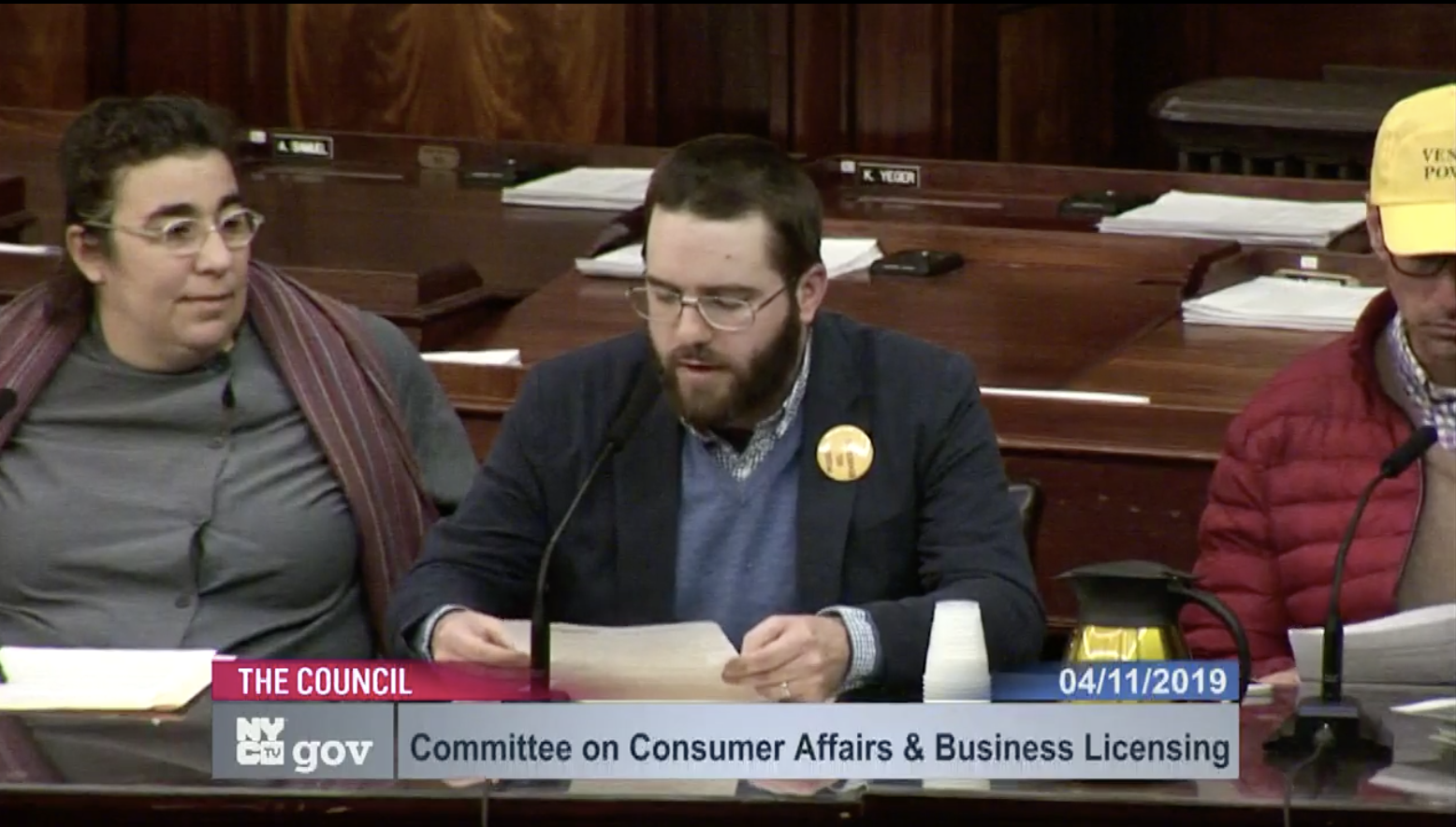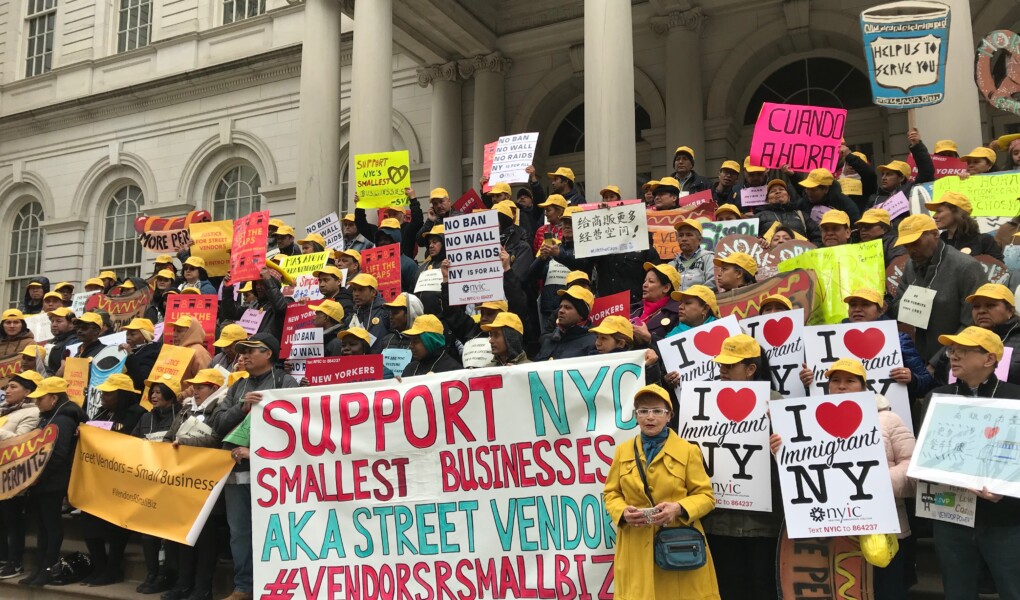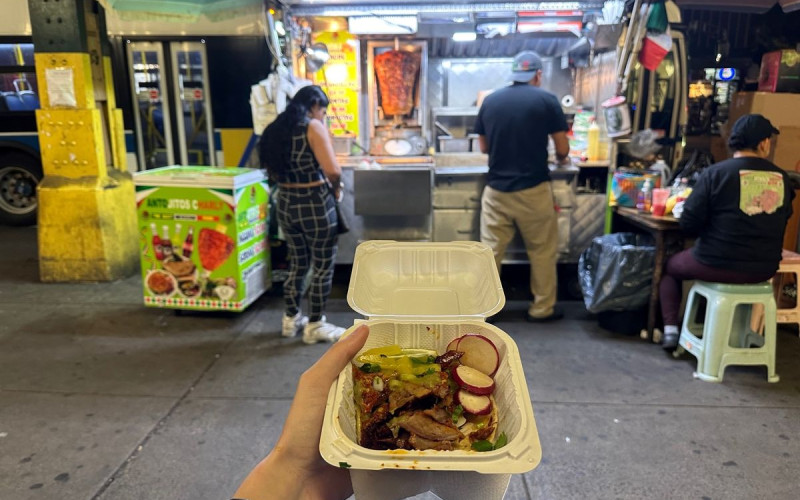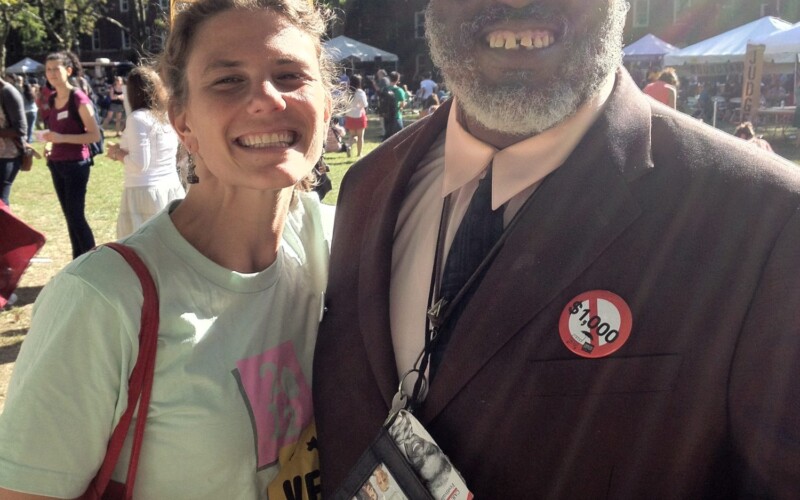On April 11, the New York City Council Committee on Consumer Affairs and Business Licensing held a hearing on a package of bills affecting street vendors, most important among them a proposal that would raise the artificial cap put on the number of mobile food vendors that has been in place since 1983. For the third time in six years, we were at City Hall with the Street Vendor Project to make our voices heard.
Intro 1116 would take several steps to address the issue of black-market permit renting. While Mobile Food Vending Permits only cost $200 for two years, they can be renewed indefinitely, and there is a hard cap of 5,100 permits available. As a result, very few permits come back into circulation, and most permit holders don’t actually vend, but rent their permit to working vendors; the going rate is currently around $25,000.
This bill is lengthy, but to summarize its main points: first, it would create a new vending enforcement unit of 100 inspectors trained specifically to interface with street vendors, something that has not existed within any city agency before. Second, it would authorize the city to issue a maximum of 400 new licenses annually for 10 years, and these new license would all be “supervisory,” meaning they are tied to the identity of the vendor, not the physical cart, making them impossible to rent out. And finally, it would create a 15-member street vending advisory board, of which at least four members would be street vendors, which would make recommendations about the issuing of new licenses and other regulations.
Before the hearing, hundreds of vendors and allies organized by the Street Vendor Project rallied on the steps of City Hall, alongside bill co-sponsors Margaret Chin and Carlos Menchaca, to demand that the city take action on these much needed reforms. Once we stepped inside, a marathon of testimony began, with vendors delivering powerful accounts of their experience vending either with a black-market permit, or without any permit at all. This was buttressed by testimony from social scientists, legal scholars, and community activists who all stressed the benefits that vendors provide to urban spaces, and the oppressive nature of the current broken system.
On the other side we heard testimony from several business improvement districts, restaurant and retail trade associations, and Community Board 8 (Upper East Side). While most touted outright opposition to the law, some, such as the Sunset Park 5th Avenue BID, asked for clarity on enforcement and better use of technology to be incorporated into the bill, not wholesale rejection.
Representatives from several city agencies, especially the Department of Health and Mental Hygiene, also voiced opposition to the bill, claiming that more time was needed to study the issue of street vending. This was problematic because, for one, they said the exact same thing when testifying about this bill two-and-a-half years ago, and when pressed by councilmembers about how long it would take to complete such a study, the DOHMH representative said that it was both (a) impossible to say, and (b) it would take many, many years.
As for the reaction of the City Councilmembers, the bill is currently too close to call. It has 25 co-sponsors, and Chin, Menchaca, Mark Levine, and Ydanis Rodriguez all expressed strong support in the hearing. Levine offered some of the best insights on the bill, when he explained that while it may result in 4,000 new permits being issued, that could be a net-zero increase in the number of vendors on the street; the bill is designed to offer a pathway for unlicensed vendors to “come out of the shadows” and gain a legal permit. But neither City Council Speaker Corey Johnson or Mayor Bill de Blasio appear to be on “Lift The Caps” train just yet.
The least insightful exchange probably came from Councilmember Peter Koo when questioning Street Vendor Project Co-Director Mohammed Attia. When Attia explained that most permit rentals are done in cash with no receipt, making it impossible for vendors to deduct the $25,000 expense on their taxes, Koo was incredulous, demanding to know why vendors don’t issue 1099s to their rentiers, which elicited quite a bit of laughter from the gallery.
You can watch the blow-by-blow of the six-and-a-half hour hearing on the City Council website, and you can watch the press conference at the pre-hearing rally on Facebook Live.

Below is our testimony, delivered by me on behalf of our team:
My name is Andrew Gustafson, and I represent Turnstile Tours. We are a social enterprise that works with non-profit organizations to develop and operate tours and educational programs across New York City. Over the past nine years, our team has had the honor to work with the Street Vendor Project and dozens of vendors through leading tours about the city’s street food industry. We have hosted well over 10,000 visitors from around the world on our Food Cart Tours in Midtown Manhattan and the Financial District, sharing the food, stories, and struggles of this amazing community of workers and entrepreneurs.
For centuries, street vending has been the vocation of people new to this country, providing opportunities to earn a living as they navigate a new country, a new language, a new culture, and a new legal system. Street vending allows people to become small business owners and build a better life for their families. It is inspiring, and sometimes heartbreaking, to hear about the struggles of vendors today, whom we have gotten to know personally and professionally, and how they built their businesses.
One way we introduce our tourgoers to the mobile food vending industry is by walking them through the steps to start your own business. Vendors need to find a cart or truck, work with a fabricator, get equipment. They need to get a food handling license. They need to find a commissary to park, clean, and provision their cart. They need to incorporate their business, get a federal tax ID, a sales tax number, and insurance. All pretty logical steps. But where the story goes off the rails is when we describe the process of getting a Mobile Food Vending Permit. The maze of waiting lists, lotteries, and back-alley deals is the story of a broken system. While the letter of the law states that the right to vend on the streets of New York City should only cost $200, the artificial cap put in place nearly 40 years ago means that most vendors end up renting their permit for upwards of $25,000.
To allow that wealth – revenue earned through hard work providing affordable meals to working people – to be captured by a select few who got lucky to receive a permit decades ago, is wrong. It is rent-seeking of the worst kind, adding no value to the system and trapping vendors in a cycle of debt and uncertainty. It is not only illogical, it is immoral.
We know so many vendors who try, desperately, to do the right thing, to follow the law to pursue the only profession that they know, the only means they have to support their families. They get a food handling license. They enter the lottery for a permit. But because they don’t have tens of thousands of dollars in cash to hand over to someone in a handshake deal, who’s name will still appear on all the documentation for their business, they often have no choice but to vend without a permit, risking arrest, fines, and the loss of their supplies and equipment.
We have a unique perspective on this issue because we have the opportunity to describe it, on a near-daily basis, to thousands of people from all over the world. And the near-unanimous response is: that makes no sense. Why would you have a system that maximizes debt, risk, and uncertainty for some of our poorest and most vulnerable fellow New Yorkers? Why would you incentivize rent-seeking over entrepreneurship, incumbency over innovation? Why would you make it harder for workers to work, and easier for people to exploit them?
As a sightseeing guide, I need a license from the city. In my 10 years of leading tours, no one has ever asked me to show that license, yet vendors face fines of up to $500 just for having their license in their pocket or temporarily obscured by their jacket or scarf. So we also need to tackle to issue of uneven, unclear, and capricious enforcement.
One thing we have noticed over the last decade of working with vendors is that as the price of a permit on the secondary market has climbed up, the price of a hot dog, falafel sandwich, or taco has not. Vendors aren’t passing these costs onto their customers, because they understand their customers are working people like them, and they know that their carts and trucks are some of the few places where you can still get a decent meal at an affordable price. Instead, they are keeping their prices low by taking money out of their own pockets. It’s time we pay them back by making meaningful reforms that will increase the number of permits, drive down the cost of secondary-market permit rental, and create a fairer, more logical, and more efficient system for everybody.
We were here two-and-a-half years ago to testify on a similar proposal, and we were told that the issue needed more study. Now again, we’re being given the same obstructionism and whataboutism. We’re just asking that you live up to the principles that are inscribed on the ceiling of this chamber from George Washington: “Our commercial policy should hold an equal and impartial hand.




